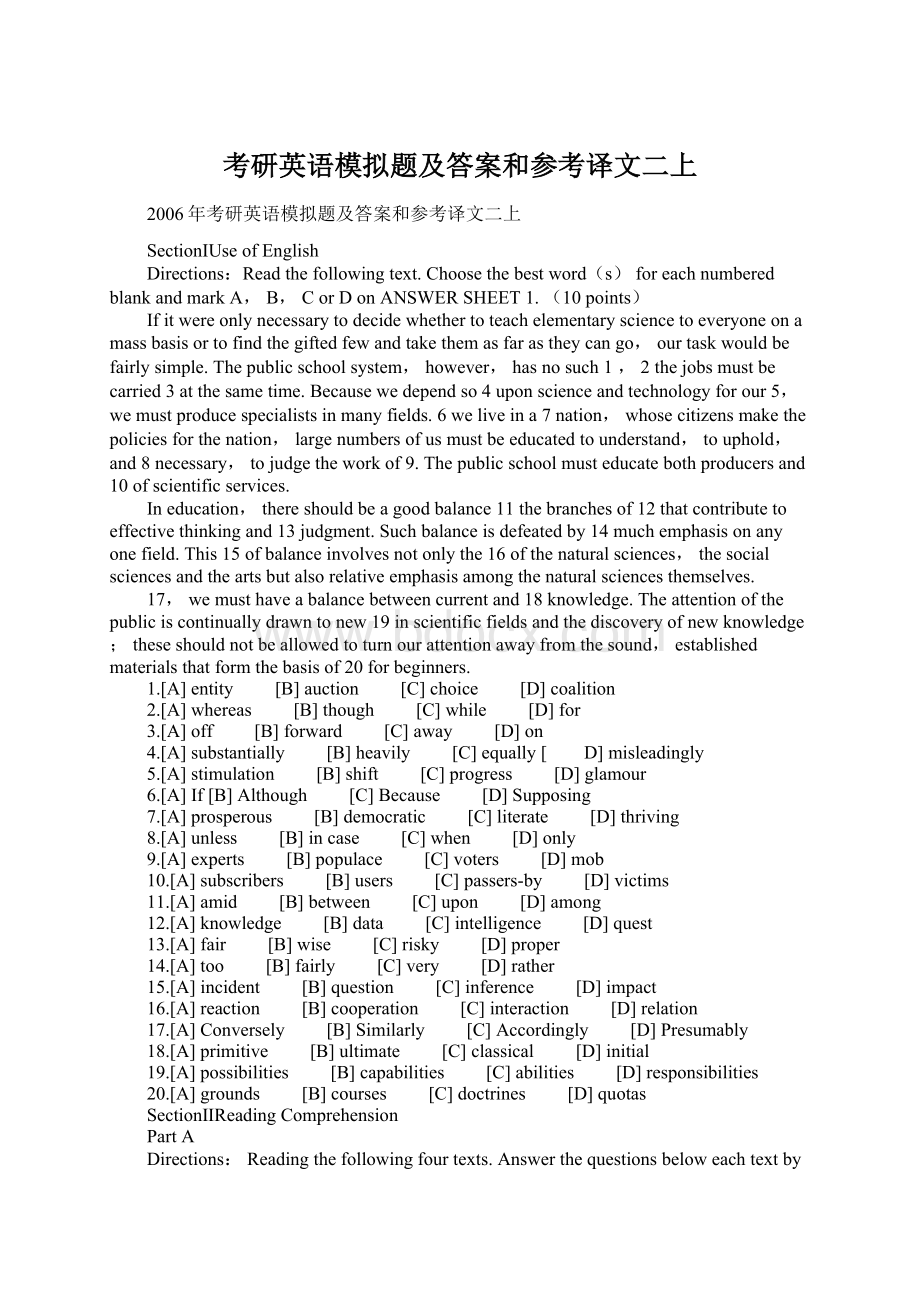考研英语模拟题及答案和参考译文二上Word下载.docx
《考研英语模拟题及答案和参考译文二上Word下载.docx》由会员分享,可在线阅读,更多相关《考研英语模拟题及答案和参考译文二上Word下载.docx(12页珍藏版)》请在冰豆网上搜索。

theseshouldnotbeallowedtoturnourattentionawayfromthesound,establishedmaterialsthatformthebasisof20forbeginners.
1.[A]entity [B]auction [C]choice [D]coalition
2.[A]whereas [B]though [C]while [D]for
3.[A]off [B]forward [C]away [D]on
4.[A]substantially [B]heavily [C]equally[ D]misleadingly
5.[A]stimulation [B]shift [C]progress [D]glamour
6.[A]If[B]Although [C]Because [D]Supposing
7.[A]prosperous [B]democratic [C]literate [D]thriving
8.[A]unless [B]incase [C]when [D]only
9.[A]experts [B]populace [C]voters [D]mob
10.[A]subscribers [B]users [C]passers-by [D]victims
11.[A]amid [B]between [C]upon [D]among
12.[A]knowledge [B]data [C]intelligence [D]quest
13.[A]fair [B]wise [C]risky [D]proper
14.[A]too [B]fairly [C]very [D]rather
15.[A]incident [B]question [C]inference [D]impact
16.[A]reaction [B]cooperation [C]interaction [D]relation
17.[A]Conversely [B]Similarly [C]Accordingly [D]Presumably
18.[A]primitive [B]ultimate [C]classical [D]initial
19.[A]possibilities [B]capabilities [C]abilities [D]responsibilities
20.[A]grounds [B]courses [C]doctrines [D]quotas
SectionⅡReadingComprehension
PartA
Readingthefollowingfourtexts.AnswerthequestionsbeloweachtextbychoosingA,B,CorD.MarkyouranswersonANSWERSHEET1.(40points)
Text1
Inthenextcenturywe‘llbeabletoalterourDNAradically,encodingourvisionsandvanitieswhileconcoctingnewlife-forms.WhenDr.Frankensteinmadehismonster,hewrestledwiththemoralissueofwhetherheshouldallowittoreproduce,“HadItheright,formyownbenefit,toinflictthecurseuponeverlastinggenerations?
”Willsuchquestionsrequireustodevelopnewmoralphilosophies?
Probablynot.Instead,we‘llreachagainforatime�瞭estedmoralconcept,onesometimescalledtheGoldenRuleandwhichKant,themillennium’smostprudentmoralist,conjuredupintoacategoricalimperative:
Dountoothersasyouwouldhavethemdountoyou;
treateachpersonasanindividualratherthanasameanstosomeend.
Underthismoralpreceptweshouldrecoilathumancloning,becauseitinevitablyentailsusinghumansasmeanstootherhumans‘endsandvaluingthemascopiesofotherswelovedorascollectionsofbodyparts,notasindividualsintheirownright.Weshouldalsodrawaline,howeverfuzzy,thatwouldpermitusinggeneticengineeringtocurediseasesanddisabilitiesbutnottochangethepersonalattributesthatmakesomeoneanindividual(IQ,physicalappearance,genderandsexuality)。
Thebiotechagewillalsogiveusmorereasontoguardourpersonalprivacy.AldousHuxleyinBraveNewWorld,gotitwrong:
ratherthancentralizingpowerinthehandsofthestate,DNAtechnologyhasempoweredindividualsandfamilies.Butthestatewillhaveanimportantrole,makingsurethatnoone,includinginsurancecompanies,canlookatourgeneticdatawithoutourpermissionoruseittodiscriminateagainstus.
Thenwecangetreadyforthebreakthroughsthatcouldcomeattheendofthenextcenturyandthetechnologyiscomparabletomappingourgenes:
plottingthe10billionormoreneuronsofourbrain.Withthatinformationwemightsomedaybeabletocreateartificialintelligencesthatthinkandexperienceconsciousnessinwaysthatareindistinguishablefromahumanbrain.Eventuallywemightbeabletoreplicateourownmindsina“dry�瞱are”machine,sothatwecouldliveonwithoutthe“wet�瞱are”ofabiologicalbrainandbody.The20thcentury‘srevolutionininfotechnologywilltherebymergewiththe21stcentury’srevolutioninbiotechnology.Butthisissciencefiction.Let‘sturnthepagenowandgetbacktorealscience.
21.Dr.Frankenstein‘sremarksarementionedinthetext
[A]togiveanepisodeoftheDNAtechnologicalbreakthroughs.
[B]tohighlighttheimportanceofameanstosomeeverlastingends.
[C]toshowhowhecreatedanewformoflifeathousandyearsago.
[D]tointroducethetopicofmoralphilosophiesincurredinbiotechnology.
22.Itcanbeconcludedfromthetextthatthetechnologyofhumancloningshouldbeemployed
[A]excessivelyandextravagantly. [B]reasonablyandcautiously.
[C]aggressivelyandindiscriminately. [D]openlyandenthusiastically.
23.Fromthetext,welearnthatAldousHuxleyisoftheopinionthat
[A]DNAtechnologyshouldbeplacedinthechargeofindividuals.
[B]governmentshouldassumelesscontroloverindividuals.
[C]peopleneedgovernmenttoprotecttheirDNAinformation.
[D]oldmoralpreceptsshouldbeabolishedonhumancloning.
24.Judgedfromtheinformationinthelastparagraph,wecanpredictthattheauthorislikelytowritewhichofthefollowinginthenextsection?
[A]Thereflectionuponbiotechnologicalmorality.
[B]Theoffensiveinvasionofourpersonalprivacy.
[C]TheinevitablechangeofIQsforourdescendants.
[D]Thepresentstateofbiotechnologicalresearch.
25.Accordingtothelastparagraph,“dry-ware”isto“wet-ware”as
[A]“collective”to“individual”。
[B]“fictional”to“factual”。
[C]“mechanical”to“corporeal”。
[D]“temporary”to“permanent”。
Text2
Beforeabigexam,asoundnight‘ssleepwilldoyoumoregoodthanporingovertextbooks.That,atleast,isthefolkwisdom.Andscience,intheformofbehavioralpsychology,supportsthatwisdom.Butsuchbehavioralstudiescannotdistinguishbetweentwocompetingtheoriesofwhysleepisgoodforthememory.Onesaysthatsleepiswhenpermanentmemoriesform.Theothersaysthattheyareactuallyformedduringtheday,butthen“edited”atnight,toflushawaywhatissuperfluous.
Totellthedifference,itisnecessarytolookintothebrainofasleepingperson,andthatishard.Butafteradecadeofpainstakingwork,ateamledbyPierreMaquetatLiegeUniversityinBelgiumhasmanagedtodoit.TheparticularstageofsleepinwhichtheBelgiangroupisinterestedinisrapideyemovement(REM)sleep,whenbrainandbodyareactive,heartrateandbloodpressureincrease,theeyesmovebackandforthbehindtheeyelidsasifwatchingamovie,andbrainwavetracesresemblethoseofwakefulness.Itisduringthisperiodofsleepthatpeoplearemostlikelytoreliveeventsofthepreviousdayindreams.
Dr.MaquetusedanelectronicdevicecalledPETtostudythebrainsofpeopleastheypracticedataskduringtheday,andastheysleptduringthefollowingnight.Thetaskrequiredthemtopressabuttonasfastaspossible,inresponsetoalightcomingoninoneofsixpositions.Astheylearnthowtodothis,theirresponsetimesgotfaster.Whattheydidnotknowwasthattheappearanceofthelightssometimesfollowedapattern—whatisreferredtoas“artificialgrammar”。
Yetthereductionsinresponsetimeshowedthattheylearntfasterwhenthepatternwaspresentthanwhentherewasnot.
Whatismore,thosewithmoretolearn(i.e.,the“grammar”,aswellasthemechanicaltaskofpushingthebutton)havemoreactivebrains.The“editing”theorywouldnotpredictthat,sincethenumberofirrelevantstimuliwouldbethesameineachcase.Andtoeliminateanydoubtsthattheexperimentalsubjectswerelearningasopposedtounlearning,theirresponsetimeswhentheywokeupwereevenquickerthanwhentheywenttosleep.
Theteam,therefore,concludedthatthenerveconnectionsinvolvedinmemoryarereinforcedthroughreactivationduringREMsleep,particularlyifthebraindetectsaninherentstructureinthematerialbeinglearnt.Sonow,ontheeveofthatcrucialtest,mathsstudentscansleepsoundlyintheknowledgethatwhattheywillrememberthenextdayarethebasicrulesofalgebraandnottheincoherenttalkfromtheradionextdoor.
26.Researchersinbehavioralpsychologyaredividedwithregardto
[A]howdreamsaremodifiedintheircourses.
[B]thedifferencebetweensleepandwakefulness.
[C]whysleepisofgreatbenefittomemory.
[D]thefunctionsofagoodnight‘ssleep.
27.Asmanifestedintheexperimentalstudy,rapideyemovementischaracterizedby
[A]intenselyactivebrainwavetraces. [B]subjects‘quickerresponsetimes.
[C]complicatedmemorypatterns. [D]revivalofeventsintheprevi